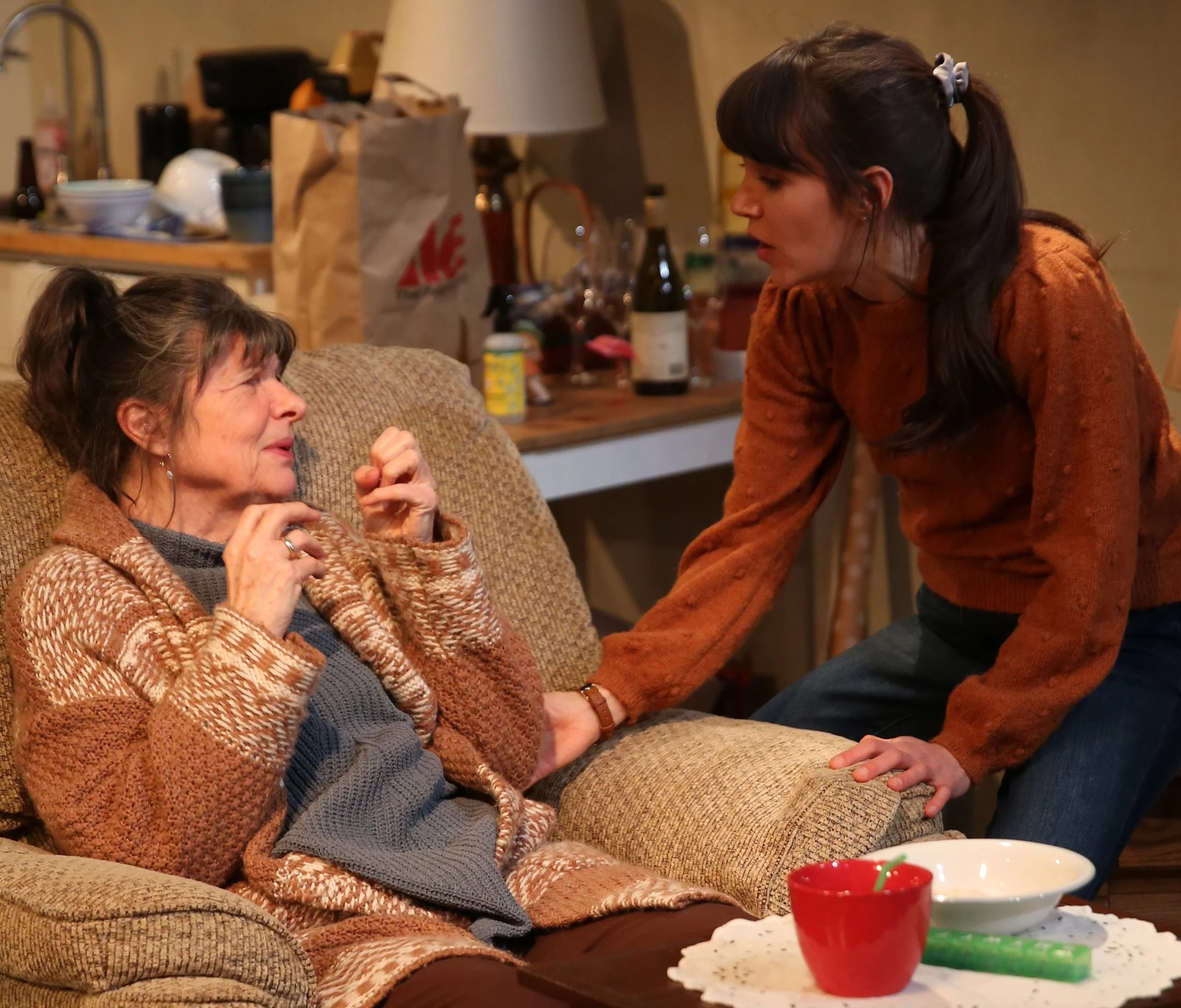Elaine (Kea Trevett, right) lives with and takes care of her mother, Ruth (Christine Farrell, left).
The opening scene of Act II of Smart is not a typical meet-cute. One person is grieving the recent death of her father and looking at an apartment she can’t afford. The other is the broker, who in her downtime has an even more difficult job of caring for a mother with dementia. Still, “meet-cute” seems a good description because the actors, well, they are cute, and they act cute as their conversation veers away from real estate and they discover what they have in common.
The two women, Elaine and Gabby, do get involved romantically, and much of Smart’s second act is devoted to their relationship. It’s quite a plot shift from the first act, which centers on Elaine and her mother, with scenes of Gabby on the phone with her father interspersed.
“Anybody with stubborn old parents who’ve lived in the same place a long time ... will recognize the clutter. ”
In both acts, scenes in the women’s respective homes take place on the same set, sometimes at the same time. A desk and a mattress on the floor serve as the set for Gabby’s apartment, while everything that fills the rest of the stage is in Elaine’s house. And in the first act, it truly does fill the stage, as Elaine’s mother, Ruth, has refused to get rid of old furniture, has covered many surfaces with doilies and figurines, and has a bunch of other belongings piled up. Anybody with stubborn old parents who’ve lived in the same place a long time—or perhaps who have themselves lived in the same place a long time—will recognize the clutter. Kudos to Yi-Hsuan (Ant) Ma for a detailed and true-to-life set design.
The actors—Kea Trevett as Elaine, Francesca Fernandez as Gabby, and Christine Farrell as Ruth—also deserve acclaim, as their beautifully calibrated performances win out over the production’s negatives: a somewhat implausible (and definitely unethical) plot point, possible audience confusion during the first act over what’s going on where and when, and that switch in the story’s focus from the first to second act.
Elaine (Trevett, left) begins a relationship with Gabby (Francesca Fernandez, right). Photographs by Carol Rosegg.
Smart, the off-Broadway debut for Mary Elizabeth Hamilton (who, according to the program, is writing a television pilot based on the play), is directed by Matt Dickson and produced under the auspices of the EST/Sloan Project, which develops stage works about science and technology. The science Smart is concerned with is voice-activated AI, better known as those virtual assistants named Siri, Alexa, etc. Or, in Smart’s case, Jenny—a device Elaine installs to help her mom, though she ends up confiding in it during her frequent bouts of insomnia. “It’s good to talk to you, Jenny. I feel like you really understand me,” Elaine says, before sharing her feelings about tending to her mother. “Sometimes I wish she’d just…that I didn’t have to…that she would, you know, that she’d just... But the funny thing is, I don’t even know what I’d do if I didn’t have this to do.”
Gabby works for the company that manufactures Jenny, listening to people’s interactions with it in order to identify miscommunication and refine the device’s grasp of human speech. In the real world, tech giants like Amazon and Google reportedly employ thousands of people who do this. They, of course, are supposed to remain detached and disinterested in what they’re hearing. But that changes when Gabby, monitoring Jenny, hears Elaine singing “Don’t Think Twice It’s Alright.” Between Trevett’s sweet and gentle rendition (singing along to Joan Baez’s cover) and the circumstances that have Elaine up in the middle of the night self-soothing with song, it is a poignant moment.
Despite the tech-lingo title, a fascination with Alexa that inspired the play, and a two-page program note about such devices titled “Mixing Convenience with Risk,” Smart doesn’t really delve into their threat to our privacy and the potential abuse of personal information they collect. Gabby’s violation is very specific and not so pernicious as it is impulsive.
The Jenny device (voiced by actor Sherz Aletaha, and aglow under Colleen Doherty’s lighting design) may bring Gabby and Elaine together, but this story is much more about relationships than technology. Fernandez and Trevett are charming as two lost people falling in love—one of them somebody who has never known what she wants but suddenly finds it, the other someone who thought she knew what she wanted but isn’t sure what to do when she gets it.
The other relationship in the play is also moving, thanks to Trevett’s realistic portrayal of vacillating between filial devotion and uncontrollable exasperation and Farrell’s strong work as Ruth attempts to fight back against her mental deterioration. It’s just jarring after intermission not to see or hear about Ruth until halfway through the act when her situation and relationship with her daughter occupy so much of Act I.
Smart runs through April 23 at Ensemble Studio Theatre (545 W. 52nd St.). Performances are at 7 p.m. Monday and Wednesday through Saturday, with matinees at 2 p.m. Saturday and 5 p.m. Sunday; ensemblestudiotheatre.org.
Playwright: Mary Elizabeth Hamilton
Direction: Matt Dickson
Sets: Yi-Hsuan (Ant) Ma
Costumes: Megan E. Rutherford
Lighting: Colleen Doherty
Sound: Josh Samuels




